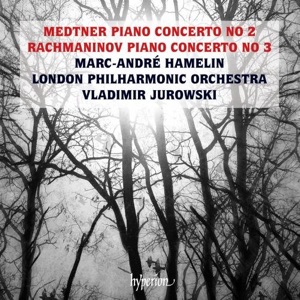Hyperion already has excellent recordings of both of these concertos, from Demidenko (Medtner) and Hough (Rachmaninov), but as they saying goes, “greatness is its own justification,” and this is a great disc. At eighty-two minutes, it’s also a very generous one. In a way, these concertos belong together. Not only were the composers friends, but both works, while cloaked in romantic virtuoso garb, are heavily symphonic in structure and syntax.
That makes Hamelin an ideal advocate. He is, of course, an exceptional keyboard virtuoso, but one of a very special type. The harder the music is to play, the easier he makes it sound. You can take the technical security completely for granted and focus entirely on matters of form and expression. In music that exists largely for virtuoso display, where a sense of strain is part of the point, this very quality can make his interpretations sound somewhat slick; but where the atrocious difficulty of the solo writing isn’t the primary focus and serves a larger purpose, as here, he is incomparable. Hamelin isn’t just a technical wizard–he’s a smart one.
I’m not sure if I am making this point optimally clear–it’s a difficult quality to describe, although easy enough to hear, especially in considering Medtner. He was a very good, if perhaps too reticent, composer. Like Rachmaninov, the bold, Russian romantic style often masks quite different musical concerns. The Second Concerto is a magnificent work in three movements: Toccata, Romanza, and Divertimento. As these characteristic titles reveal, Medtner is thinking of formal archetypes and genre as much as flash and dash. They are equally important.
The result, though certainly thematically attractive, lacks the big tunes that Medtner’s provenance prompts us to expect. But because the compositional artistry is so strong, the work grows on you with repetition. There’s real musical substance, and Hamelin proves the perfect guide to take us on this particular journey. His ability to shape and master thickets of notes without producing a feeling of heaviness in the work’s outer movements keeps the listener engaged without a trace of monotony. Even with fine versions from the likes of Tozer, Sudbin, Demidenko, and Sherbakov, this is outstanding.
Memorable tunes, of course, were never Rachmaninov’s problem, but the Third Concerto is still one of his most formally successful pieces. It’s probably fair to say that just about all of the main themes occur in the first movement, with the next two providing variations and amplifications of them. Sure, it’s wonderful to hear the music played with insane virtuoso abandon: that’s why God invented Martha Argerich after all, but there’s still room for a more “symphonic” approach.
Don’t get me wrong, Hamelin isn’t ever too slow or labored. The moments that stand out most are just different: the perfect integration of Rachmaninov’s second, shorter first movement cadenza; the way the quick waltz episode glides out of the slow movement; the balance of the hands in the finale’s second subject; and many other places where unexpected beauty emerges from passages that so often come across as piles of undifferentiated notes. In this performance, everything has shape, point, and flow. Having Vladimir Jurowski on hand as very much an equal partner also helps immeasurably. Hyperion’s excellent engineers can respect the balances between solo and orchestra confident that when the ensemble takes over, the result will be just as characterful and intelligent.
In other words, this long review boils down to a short conclusion: buy this.
































